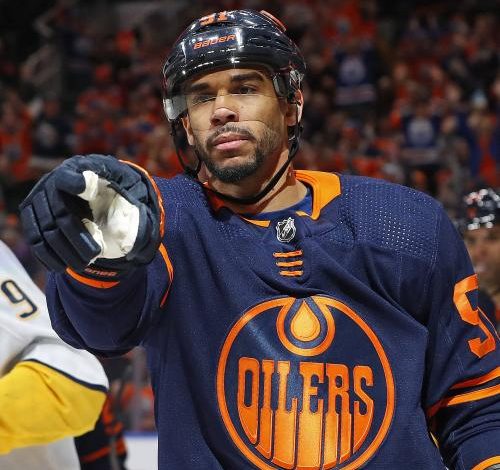Kane Sounds Off: Oilers Forward Criticizes Stanley Cup Final Officiating Amidst Mounting Frustration

The Stanley Cup Final is the pinnacle of professional hockey, a crucible where emotions run high and every decision, on and off the ice, is magnified under an unforgiving spotlight. For the Edmonton Oilers in the 2024 Final against the Florida Panthers, the mounting frustrations of falling behind in the series reached a boiling point, culminating in pointed criticism of the officiating from veteran forward Evander Kane. Following a particularly tumultuous Game 3, which saw the Oilers buried under a mountain of penalties and a lopsided score, Kane didn’t mince words, directly calling out what he perceived as a blatant “double standard” in how penalties were being called—or, more accurately, not called—against the Panthers.
His fiery remarks came hot on the heels of head coach Kris Knoblauch’s more subtle, sarcastic jab at the referees, indicating a widespread and deeply felt grievance within the Oilers’ locker room. Kane’s comments were a stark expression of the team’s growing exasperation with a series that felt increasingly out of their control, not just due to the Panthers’ formidable play, but due to what they viewed as inconsistent enforcement of the rules.
The Context of Frustration: Game 3’s Penalty Meltdown
Game 3 of the 2024 Stanley Cup Final was a chaotic affair for the Edmonton Oilers. After dropping the first two games in Florida, the Oilers returned home to what was supposed to be a revitalizing atmosphere. Instead, the game quickly devolved into a penalty-filled nightmare, particularly for Edmonton. The Oilers accumulated a staggering 21 minor penalties, contributing to a combined 140 penalty minutes in the game—a near-record for a Stanley Cup Final contest. This constant parade to the sin bin severely hampered Edmonton’s ability to generate any consistent offensive rhythm, as their star players like Connor McDavid and Leon Draisaitl spent an inordinate amount of time on the penalty kill or watching from the bench.
The Florida Panthers, known for their aggressive, physical, and often chippy style, thrived in this environment. They converted on three of their 11 power-play opportunities, ruthlessly capitalizing on Edmonton’s lack of discipline. The game spiraled out of control, marked by numerous skirmishes and a full-line brawl in the third period that underscored the bubbling tension and frustration. For the Oilers, the game felt less like a strategic hockey match and more like a never-ending cycle of defensive scrambles and emotional outbursts.
Evander Kane’s Direct Accusation: “They Seem to Get Away With It More”
It was in this immediate aftermath of the 6-1 rout that Evander Kane stepped to the microphone, his frustration palpable. When asked about the disparity in penalties and the game’s physicality, Kane didn’t hold back.
“They seem to get away with it more than we do,” Kane declared, a direct accusation of a double standard. He continued, “It’s tough to find the line—they’re doing just as much stuff as we do. It was 4-4 at the end of it, then it gets out of hand and there seems to be a little more attention to our group.”
Kane’s comments highlighted several key grievances:
- Inconsistent Enforcement: The core of his complaint was the perceived difference in how infractions were judged for each team. The Panthers’ physical play, according to Kane, was often overlooked, while similar actions by the Oilers drew immediate penalties.
- Lack of Clarity on the “Line”: He expressed frustration with the ambiguity of what constituted a penalty. In a highly physical series, players are constantly trying to play aggressively without crossing the line. Kane’s frustration stemmed from feeling that the line was being applied unevenly, making it “tough to find.”
- Targeted Officiating: The phrase “a little more attention to our group” suggested a belief that the referees were scrutinizing the Oilers more closely or were quicker to call penalties on them.
- Contributing to the Game Getting “Out of Hand”: Kane implied that the inconsistent officiating contributed to the game devolving into a penalty-filled mess. If calls were balanced, perhaps the game wouldn’t have spiraled into such undisciplined play.
Kane’s remarks resonated with Oilers fans and many analysts who had observed similar patterns throughout the series. They built upon head coach Kris Knoblauch’s more veiled, sarcastic comments after Game 3, where he “praised” the referees for catching a “too many men” penalty in Game 3 while pointedly wishing they had called a similar infraction in Game 2’s overtime. This collective frustration from the Oilers’ bench painted a clear picture: they felt aggrieved by the officiating.
The Panthers’ Physicality vs. The Oilers’ Discipline
The dynamic between the Oilers and Panthers in the Final was intrinsically tied to the officiating. The Panthers are renowned for their relentless, suffocating forecheck and their willingness to engage physically with every opponent. Players like Sam Bennett, Matthew Tkachuk, and Nick Cousins are masters of agitating, getting under opponents’ skin, and creating chaos. Their game thrives on pushing boundaries and forcing opponents into uncomfortable situations.
For the Oilers, a team built on speed, skill, and a lethal power play, this physical onslaught often felt like being dragged into a different kind of game—a messy, gritty, penalty-laden affair that countered their strengths. When penalties were called, the Oilers felt they were often on the wrong end, limiting their offensive flow and exhausting their penalty killers.
Kane’s comments highlighted the inherent challenge of officiating a series between two teams with such contrasting styles. The referees face an immense task in maintaining control while allowing the game to flow and not over-calling every minor infraction. However, from the Oilers’ perspective, this balance was not being achieved, leading to a palpable sense of injustice.
The Implications of Criticizing Officiating
In the NHL, direct criticism of officiating by players or coaches is a risky endeavor. The league has a strict policy against it, often resulting in fines, sometimes substantial ones. Players are generally coached to use vague language or redirect questions to avoid disciplinary action.
Evander Kane’s decision to speak so candidly demonstrated the depth of his frustration and, by extension, that of his teammates. Such comments carry several implications:
- Risk of Fines: Kane understood the potential financial consequences but clearly felt the issue was significant enough to warrant public discourse.
- Sending a Message to the League: While frowned upon, public criticism from a prominent player can put pressure on the league’s officiating department to review and potentially address perceived inconsistencies.
- Rallying the Team: For a team facing a significant deficit, a player speaking out against perceived unfairness can create an “us against the world” mentality, galvanizing the locker room and potentially channeling frustration into renewed resolve.
- Fueling the Opponent: Conversely, such comments can also serve to motivate the opposing team, providing them with more ammunition and a sense of vindication for their aggressive play. The Panthers are a team that thrives on antagonism, and such critiques might have just fueled their fire.
Kane’s Reputation and the Weight of His Words
Evander Kane himself is no stranger to physicality or controversy. Known for his aggressive, often polarizing style of play, he is a physical force who consistently plays on the edge. This dual identity adds a layer of complexity to his comments. On one hand, his personal experience with physical play makes his assessment of the “line” more credible; he understands the nuances of contact. On the other hand, his own history as a player who often draws penalties or engages in contentious situations might lead some to dismiss his complaints as self-serving.
However, in the context of the Stanley Cup Final, with the stakes at their absolute highest, Kane’s words resonated deeply within the Oilers’ fan base and amongst those who agreed with his assessment of the officiating. His willingness to speak plainly, even at risk of repercussion, underscored the severity of the team’s frustrations.
Ultimately, the debate over officiating is an almost constant companion in high-stakes playoff hockey. Teams, driven by the intensity of competition, often feel aggrieved by calls that go against them or non-calls that benefit their opponents. Evander Kane’s outspoken criticism of the Stanley Cup Final officiating was a powerful manifestation of this perennial tension.
His “double standard” accusation after Game 3 reflected a deep-seated frustration within the Oilers’ ranks that transcended the simple outcome of a single game. It highlighted the perception that the Panthers’ aggressive identity was being afforded a wider berth by the referees, allowing them to dictate the terms of engagement in a way that disadvantaged Edmonton. While the Panthers ultimately lifted the Stanley Cup, cementing their dominance, Kane’s comments remain a significant part of the narrative of that fiercely contested series, underscoring the razor-thin margins and the profound psychological impact of every decision in the pursuit of hockey’s ultimate prize.









